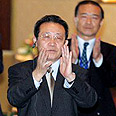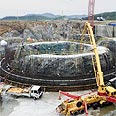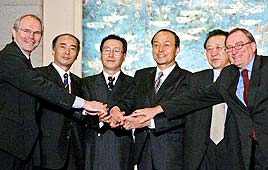

North Korea pledged to drop its nuclear weapons development and rejoin international arms treaties in a unanimous agreement Monday at six-party arms talks — the first breakthrough in more than two years of negotiations.
The North "committed to abandoning all nuclear weapons and existing nuclear programs and returning at an early date" to the Nuclear Nonproliferation Treaty and International Atomic Energy Agency safeguards, according to the agreement.
In exchange, the North would receive energy assistance and a pledge from the United States that it won't attack.
U.S. Assistant Secretary of State Christopher Hill, the U.S. envoy to the talks, praised the agreement but urged the North Koreans to stop operations at their main nuclear facility at Yongbyon.
"It's a good agreement for all of us," Hill said. But he added: "We have to see what comes in the days and weeks ahead. We have to seize the momentum of this."
Talks to continue in November
Negotiators agreed to hold more talks in November, where they were expected to move on to concrete discussions about implementing the broad principles outlined in Monday's agreement. Hill has warned that could still be a long process.

Normalizing relations (Photo: Reuters)
"The six parties unanimously reaffirmed that the goal of the six-party talks is the verifiable denuclearization of the Korean Peninsula in a peaceful manner," the statement said.
North Korea and United States also pledged in the agreement to respect each other's sovereignty and right to peaceful coexistence, and also to take steps to normalize relations.
"The United States affirmed that it has no nuclear weapons on the Korean Peninsula and has no intention to attack or invade (North Korea) with nuclear or conventional weapons," according to the statement, in assurances echoed by South Korea.
The talks, which began in August 2003, include China, Japan, Russia, the United States and the two Koreas.
Civilian nuclear programs to be discussed in future
The negotiations had been deadlocked over North Korea's demand that it keep the right to civilian nuclear programs after it disarms, and the statement acknowledges the North has made such an assertion but doesn't go beyond that.
North Korea had also demanded that it be given a light-water nuclear reactor at the latest talks — a type less easily diverted for weapons use — but Washington had said it and other countries at the talks wouldn't meet that request.
Putting aside the question for now, the joint statement said: "The other parties expressed their respect and agreed to discuss at an appropriate time the subject of the provision of light-water reactor" to North Korea.
North Korea has also refused to totally disarm without getting concessions along the way, while Washington has said it wants to see the weapons programs totally dismantled before granting rewards. The statement, however, says the sides agreed to take steps to implement the agreement "in a phased manner in line with the principle of 'commitment for commitment, action for action.'"
The other countries at the talks said they were willing to give energy assistance to the North, including a South Korean plan to deliver electricity across the heavily armed border dividing the peninsula.
Normalizing relations with Japan
"This is the most important result since the six-party talks started more than two years ago," said Chinese Vice Foreign Minister Wu Dawei, Beijing's envoy.
Tang Jiaxuan, a former foreign minister and now state councilor, congratulated the delegates, praising the agreement for having "succinct wording and profound content."
North Korea was promised two light-water reactors under a 1994 deal with Washington to abandon its nuclear weapons. That agreement fell apart in late 2002 with the outbreak of the latest nuclear crisis, when U.S. officials said North Korea admitted having a secret uranium enrichment program.
The North is believed to have enough radioactive material for about a half-dozen bombs from its publicly acknowledged plutonium program, but hasn't performed any known nuclear tests to prove its capability. In February, the North claimed it had nuclear weapons.
Japan and North Korea also said in the statement they would move to normalize relations regarding "the outstanding issues of concern." The reference appears to allude to Tokyo's concerns over its citizens that the North has admitted abducting.















